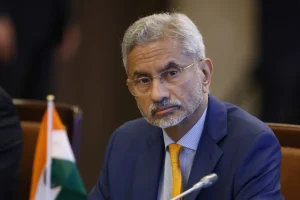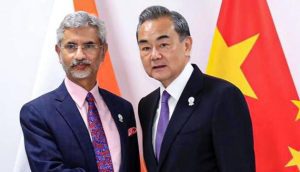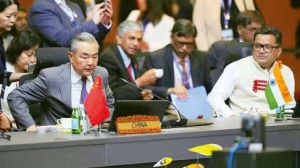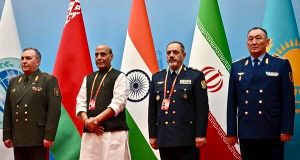New Delhi – The highly anticipated Jaishankar In China visit represents a significant diplomatic milestone as External Affairs Minister S Jaishankar embarks on his first trip to Beijing in five years. This historic journey comes at a crucial juncture when India and China are attempting to rebuild their relationship following the devastating 2020 Galwan Valley clash that brought bilateral ties to their lowest point in six decades.
The Jaishankar In China visit carries immense strategic importance as both nations seek to resolve the complex border disputes and military standoffs that have plagued their relationship since the deadly confrontation along the Line of Actual Control. The timing of this diplomatic mission is particularly significant given the recent developments in regional geopolitics and the ongoing challenges in India-China relations.
Strategic Arrival and Diplomatic Schedule

According to official reports, Jaishankar In China trip began with his scheduled arrival in Beijing on Sunday evening, following the completion of his Singapore visit as part of his two-nation diplomatic tour. The carefully planned itinerary demonstrates the high-level diplomatic engagement both countries are pursuing to address their strained relationship.
The Jaishankar In China visit includes participation in the Shanghai Cooperation Organisation (SCO) Foreign Ministers’ meeting in Tianjin on Tuesday, where he will engage with counterparts from multiple regional powers. Additionally, the visit will feature crucial bilateral talks with Chinese Foreign Minister Wang Yi, marking the first high-level direct diplomatic engagement between the two foreign ministers since the border tensions escalated.
Also Read: Nigeria in Mourning After Former President Muhammadu Buhari Dies at 82 in London
Galwan Valley Clash: The Turning Point


The Jaishankar In China visit occurs against the backdrop of the traumatic Galwan Valley incident that fundamentally altered India-China relations. The military standoff along the Line of Actual Control in May 2020 escalated into the first deadly conflict between Indian and Chinese forces in 45 years, resulting in casualties on both sides and plummeting bilateral ties to unprecedented lows.
The seven-hour deadly conflict on June 15, 2020, led to the deaths of 20 Indian soldiers, including a commanding officer, while reports suggested the Chinese army possibly suffered more than twice the casualties. This tragic incident made the current Jaishankar In China visit even more significant as it represents the first major diplomatic effort to rebuild trust and communication channels between the two nations.
Recent Breakthrough in Border Negotiations


The Jaishankar In China visit comes after important developments in border negotiations that occurred over four years following the initial clashes. Prime Minister Narendra Modi and Chinese President Xi Jinping reportedly decided to reactivate several mechanisms to resolve border issues when they met on the sidelines of a summit in Kazan in October 2024.
Following their meeting, India and China announced a breakthrough regarding patrolling arrangements along the Line of Actual Control in eastern Ladakh. This development involved resolving their standoff in Depsang and Demchok areas through a negotiated agreement to address their military dispute, creating a more favorable environment for the Jaishankar In China diplomatic mission.
China’s Support for Pakistan Complicates Relations
The Jaishankar In China visit becomes more complex considering China’s recent military support to Pakistan during the India-Pakistan conflict triggered by the Pahalgam terror attack that resulted in 26 civilian deaths. This development has added another layer of complexity to India-China relations, making the diplomatic mission even more challenging.
According to India’s Deputy Chief of Army Staff Rahul R Singh, 81 percent of Pakistan’s military hardware used during the conflict was manufactured by China. The senior military official emphasized that while Pakistan was the front face of the conflict, China provided substantial support, effectively making it a case of “one border, two adversaries.”
Chinese Diplomatic Stance on Pakistan Support

The Jaishankar In China discussions will likely address China’s continued support for Pakistan despite attempts to improve India-China relations. While China condemned the Pahalgam terror attack and stated its opposition to “all forms of terrorism,” it simultaneously expressed support for its close ally Pakistan in safeguarding sovereignty and security.
Even after New Delhi and Islamabad announced a ceasefire following the three-day military conflict in May, China openly vowed support to Pakistan in defending its “national sovereignty and territorial integrity.” Chinese Foreign Minister Wang Yi called Pakistan an “ironclad friend” and committed to deepening the “all-weather strategic cooperative partnership” between the two countries, creating additional challenges for the Jaishankar In China diplomatic mission.
Shanghai Cooperation Organisation Context
The Jaishankar In China visit’s inclusion of the SCO Foreign Ministers’ meeting in Tianjin provides a multilateral platform for diplomatic engagement. This regional forum offers an opportunity for India and China to interact within a broader Asian security architecture, potentially facilitating more constructive dialogue on regional stability and cooperation.
The SCO meeting context for the Jaishankar In China visit allows both nations to address their bilateral issues while considering broader regional implications. This multilateral setting may provide a more conducive environment for productive discussions on various contentious issues affecting India-China relations.
Previous High-Level Diplomatic Visits


The Jaishankar In China visit follows recent high-level diplomatic engagement, including visits by Defence Minister Rajnath Singh and National Security Advisor Ajit Doval in June. These previous interactions have helped prepare the ground for the current diplomatic mission, suggesting a coordinated approach to rebuilding India-China relations.
The sequence of high-level visits culminating in the Jaishankar In China trip demonstrates both countries’ commitment to pursuing diplomatic solutions to their complex relationship challenges. These engagements represent a systematic approach to addressing multiple dimensions of bilateral cooperation and conflict resolution.
Expectations and Diplomatic Outcomes
The Jaishankar In China visit carries significant expectations for constructive dialogue between the two Asian giants. Given the tumultuous relationship over the past five years, this diplomatic mission represents a critical opportunity to establish more stable communication channels and address persistent areas of disagreement.
The success of the Jaishankar In China visit will likely be measured by the ability to establish practical mechanisms for managing border disputes, reducing military tensions, and creating frameworks for broader bilateral cooperation. The international community will closely watch this diplomatic engagement as it could significantly impact regional stability and Asian geopolitics.
Concluding Statements: A Critical Diplomatic Moment
The Jaishankar In China visit represents more than a routine diplomatic engagement; it symbolizes both nations’ recognition that their relationship requires careful management despite fundamental disagreements. The outcome of this historic visit may determine whether India and China can establish a more stable foundation for their complex relationship moving forward.
As the Jaishankar In China mission unfolds, it will test both countries’ commitment to diplomatic solutions and their ability to compartmentalize various issues while pursuing areas of mutual interest and regional stability.

